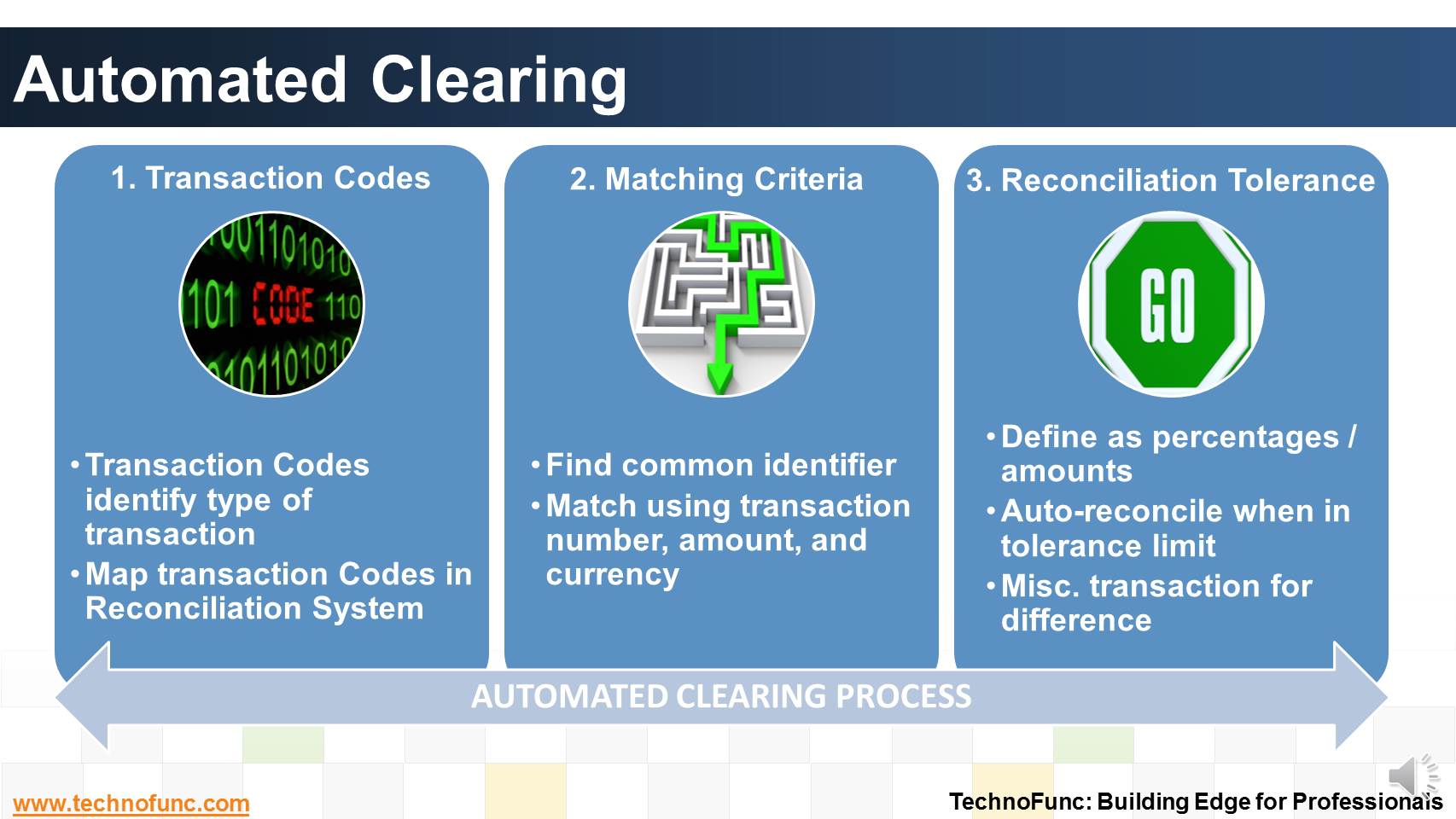- Home
- Business Processes
- Industry Knowledge
- Aerospace Industry
- Automotive Industry
- Banking Domain
- BFSI Industry
- Consumer/ FMCG Industry
- Chemicals Industry
- Engineering & Construction
- Energy Industry
- Education Domain
- Finance Domain
- Hospitality Domain
- Healthcare Industry
- Insurance Domain
- Retail Industry
- Travel and Tourism Domain
- Telecom Industry
- Leadership Skills
- eLearning
- Home
- Functional
- Order to Cash
- Automated Clearing
Automated Clearing
In automated clearing, Bank statement details are automatically matched and reconciled with system transactions. Learn how this process works and what are the perquisites to enable the same.
Automated Clearing
In automated clearing, Bank statement details are automatically matched and reconciled with system transactions.
This method is ideally suited for bank accounts that have a high volume of transactions.
The following three are the basic steps are involved in Automated Clearing Process:
1 Map Transaction Codes
Bank statement lines are coded to identify the type of transaction the line represents. Since each bank might use a different set of transaction codes, the first step towards automatic clearing is to map each code that is used by a particular bank for which the transactions need to be reconciled.
2 Matching Criteria
Automated matching can only be done if you can find a common identifier between the transaction details as recorded in your sub ledgers and the bank statement.
Automated systems generally match a bank statement line against a payables payment transaction, receivables receipt transaction, payroll disbursals and miscellaneous transactions using a transaction number (such as the payment or deposit number), bank account, amount, and currency.
3 Reconciliation Tolerance:
Reconciliation tolerances are defined in the system as percentages and/or amounts.
If tolerance is defined then the difference between the statement line and sub-ledger transaction line will be auto-reconciled when it is within the tolerance limit. The system also creates a miscellaneous transaction for the difference between the remittance batch amount and the bank statement line.

Related Links
You May Also Like
-
Complete Bank Reconciliation Process
Bank Reconciliation Process is a eight step process starting from uploading the Bank Statement to finally posting the entries in General Ledger. Learn the Eight Steps in Detail!
-
In manual clearing, Bank statement details are to be matched manually considering certain rules. Learn the steps involved in manual clearing of bank transactions.
-
Before we dive into cash management, let us fist understand what we mean by cash and what constitutes cash in context of cash management process.
-
What is Account Reconciliation?
Before you understand the Bank Reconciliation Process it is important to understand what is account reconciliation and why it is carried out.
-
Cash Clearing – Accounting Entries
The Cash Clearing process enables you to track amounts that have actually cleared your bank. Learn the steps and accounting entries that gets generated during the cash clearing process.
-
The topic for this lesson is "Introduction to Cash Management Process". We start with the learning objectives for building requisite functional expertise in cash management process.
-
So many codes in the lines that are there in a Bank Statement. It contain lots and lots of meaningful information that can help automated many tasks. Explore more!
-
Collection Float is the time spent to collect receivables. Collection float is the sum total of time taken by Invoice Float; Mail Float; Processing Float and Availability Float. Explore more!
-
Disbursement Float is the time taken from payment creation to settlement. Collection float is the sum total of time taken by Payment Float; Mail Float; Processing Float and Availability Float. Learn more!
-
Introduction to Bank Reconciliation Process
These set of articles provide a brief introduction to Bank Reconciliation Process. This topic not only discusses the meaning of bank reconciliation process but also discusses how this process in handled in new age ERPs and Automated Reconciliation Systems.
Explore Our Free Training Articles or
Sign Up to Start With Our eLearning Courses

About Us
Learning
© 2023 TechnoFunc, All Rights Reserved










